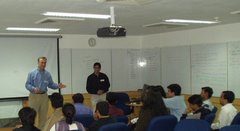Here is something that many people don't know - but many of us hope for. To be great, you don't have to be born with it. Greatness "ain't innate."
Many people don't even try - or if they do - they don't try hard enough. They say to themselves, "Why even bother. If I am not born with brains and beauty - I can never be successful." So most people avoid the thought of embarrassing themselve and trying to be great.
Geoffrey Colvin wrote a great article http://biz.yahoo.com/weekend/great_1.html that should give all of us the excitement and energy and most importantly the nerve to try and become more than we are - (please read this article, it's what I have been telling EVERYONE for the past 18 years http://biz.yahoo.com/weekend/great_1.html ).
(I first came across the idea and concept of becoming good at something from Brian Tracy http://www.briantracy.com/ . If you do want to see something on "how to become good or great in your field watch his Pathways to Personal Progress. (more on Brian Tracy in a later Blog report)
Back to the story . . .
British-based researchers Michael J. Howe, Jane W. Davidson and John A. Sluboda conclude in an extensive study, "The evidence we have surveyed ... does not support the [notion that] excelling is a consequence of possessing innate gifts."
Hard Work and "Deliberate Practice"
The first major conclusion is that greatness isn't handed to anyone; it requires a lot of hard work. HARD work. Colvin says something I disagree with - he says essentially, a lot people work hard. I think people work, but they waste a lot of time and energy on things that don't matter. The researchers - and to be fair Colvin points this out - "The best people in any field are those who devote the most hours to what the researchers call 'deliberate practice.' It's activity that's explicitly intended to improve performance . . ."
The Importance of Important Work
It is this "deliberate practice" on the work that is important to that field that I believe makes the critical difference in becoming great in your field or area of business. Professor Ericsson from Florida State University notes, "Elite performers in many diverse domains have been found to practice, on the average, roughly the same amount every day, including weekends." That is, they practice on average "10,000 hours of deliberate practice." That's 250, 40 hour weeks of deliberate practice on the right/important things. That's about 5 years of deliberate practice. The next-best averaged 7,500 hours; and the next, 5,000 hours.
What About Child Prodigies?
Sure, there are exceptions. What about the child chess prodigy? Well Bobby Fischer was thought to be the child chess prodigy as so many Russians were back in the 1960's to 1990's except for one small thing - they learned chess early and practiced every day for - like in the case of Bobby Fischer - for 7 years - except little Bobby practiced sometimes 16 hours a DAY, seven days a week - intensely!
But there are exceptions. Everyone learns atdifferent rates, someone may learn at a faster rate. And they may study and deliberately practice the more important and critical points. This is not to argue that we all are the same. The point is - we all can become great at something through practice - and over time.
Some How Do You Apply "Deliberate Practice?"
Here's how; you create the practice in your work, which requires thinking about what you are doing with the mindset of "how do I become better at this?" not just "how can I get this done?".
So instead of merely trying to get it done, aim to get better at it.
What Are The Essentials of Your Job?
But I would determine first - what are the most critical elements of your job? And focus on getting better at the critical things. There are about 5 to 7 areas that are critical to each and every job. And those areas have specific tasks that make up that area or category. But make sure they are the critical things; getting better at making copies by standing at a copy machine will not help you - except out the door. Okay, now that was an extreme example, but you get the point.
Why Feedback Is An Essential To Getting The Essentials of Your Job Right
Colvin points out that feedback is another essential. I agree. Thinking you are doing a good job is different than what your boss or clients think. You may be working really hard on something that doesn't matter to them. Or you may think you're doing the thing right - and you are not.
Anyway, the point is "Ask." Also, a lot of successful people had and still have "advisors" or mentors - who in terms of feedback - provided it.
See Your Work From A Strategic Vantage Point
Also - think of the elements of your job - as pieces of a large jigsaw puzzle. See how each fits together - as if you are standing above it looking down. Once you've done that - look to see the other parts of the company fit together - and then add your job to the puzzle. And then look to see how the outside influences your company and job. You will be able to see how your job could change or how you could adapt your job over time because of the outside influences on your company.
Last, there is no way for you to become better with deliberate practice without getting excited about "getting better." You need passion to want to deliberately practice. And the best way to get passion is to see yourself as becoming one of the best - because not everyone will want to nor understand that they can (because they haven't read this post!).
Try these ideas at work - every day - for the next five years. And call me in the morning.
Monday, October 23, 2006
The Success Secret - Revealed - You don't have to be born with it!
Posted by
Joe
at
12:53 PM
![]()
Subscribe to:
Post Comments (Atom)









1 comment:
This is pretty interesting. Saw your website. I like this material - we all need to get better in our jobs. keep up the blog.
Jim Greene
US Worldwide Sales
Post a Comment